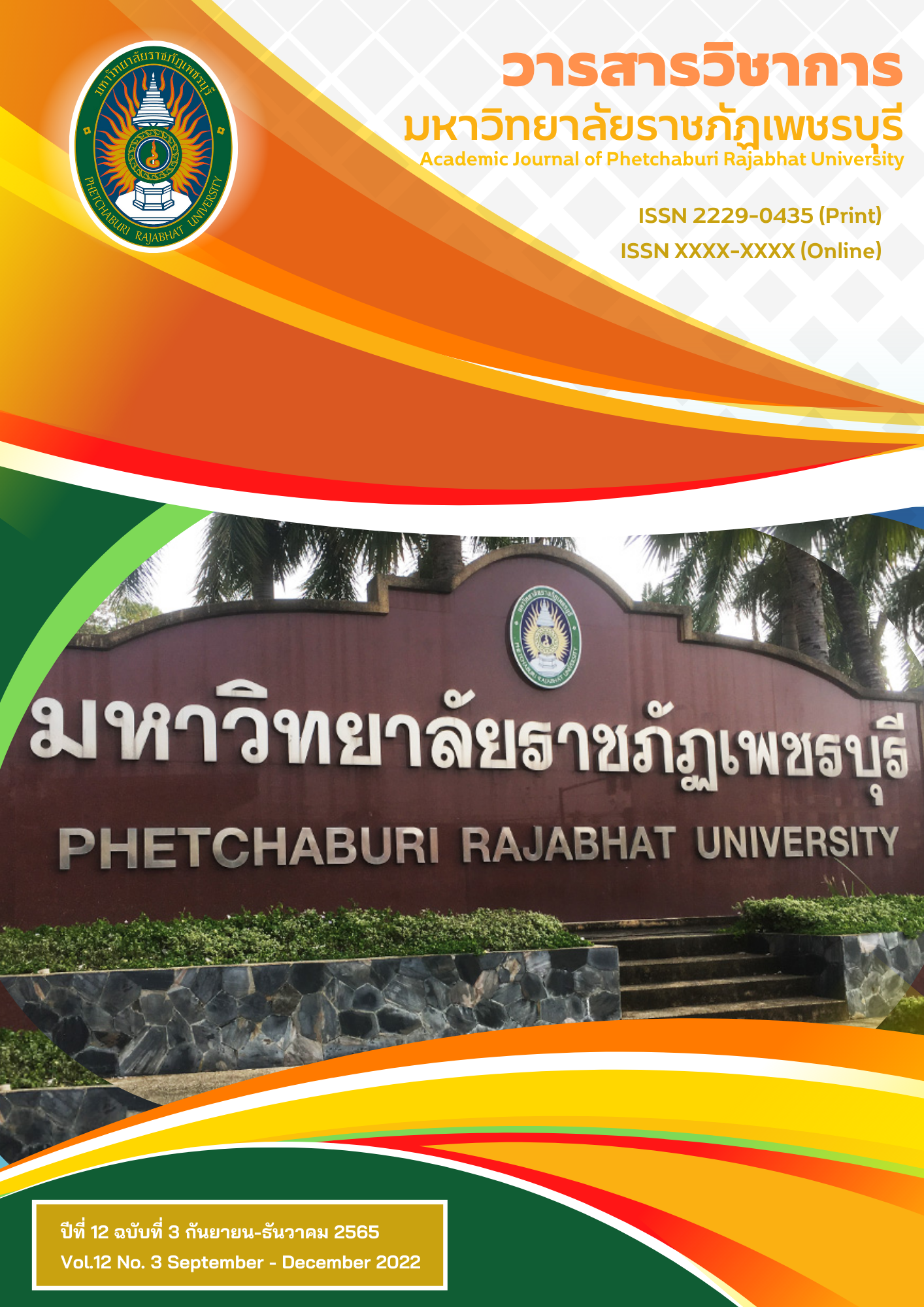ศิลปศึกษาที่เน้นผู้เรียนเป็นสำคัญในการพัฒนาท้องถิ่น
Main Article Content
บทคัดย่อ
บทความวิชาการเรื่องศิลปศึกษาที่เน้นผู้เรียนเป็นสำคัญในการพัฒนาท้องถิ่น มีวัตถุประสงค์เพื่อนำเสนอการออกแบบหลักสูตรและการเรียนการสอนที่เป็นการเรียนรู้อย่างกว้างหรือองค์รวม (Broad – Based and Holistic Learning) เชื่อมโยงเนื้อหาสาระ และการบูรณาการความรู้ การแก้ปัญหา การใช้เทคโนโลยีโดยเน้นผู้เรียนเป็นศูนย์กลางที่เกี่ยวข้องกับชีวิตจริงในสังคม ชุมชนและบริบทพื้นที่ท้องถิ่น การเรียนรู้แบบโครงงาน (Project – Based Learning: PBL) การเรียนรู้โดยใช้บริบทสถานที่เป็นฐาน (Place – Based Learning: PBL) การเรียนรู้โดยใช้ชุมชนเป็นฐาน (Community – Based Learning: CBL) การบริหารจัดการชั้นเรียนเชิงรุก (Active Learning) การเรียนการสอนโดยมุ่งผลลัพธ์ (Backward Design) การสะท้อนผลและการเพิ่มพลังการเรียนรู้ (Empowering Learning) โดยใช้การบูรณาการศิลปศึกษาผ่านกระบวนการปฏิบัติโดยเน้นผู้เรียนเป็นสำคัญในการพัฒนาท้องถิ่นตามศาสตร์พระราชา หลักการทรงงานตามแนวพระราชดำริ เข้าใจ เข้าถึง พัฒนา ในการนำศิลปศึกษาเพื่อการศึกษาพัฒนาผู้เรียนให้เห็นคุณค่าของท้องถิ่น เท่าทันการเปลี่ยนแปลงของสังคมและความก้าวหน้าของเทคโนโลยีดิจิทัลและความปกติใหม่ ต่อยอดภูมิปัญญาเพื่อการดำรงอยู่ แก้ปัญหาและพัฒนาท้องถิ่น
Article Details

อนุญาตภายใต้เงื่อนไข Creative Commons Attribution-NonCommercial-NoDerivatives 4.0 International License.
บทความนี้ยังไม่เคยลงตีพิมพ์ในวารสารใดมาก่อน และไม่อยู่ระหว่างการพิจารณาของวารสารอื่น
บทความที่ลงพิมพ์เป็นข้อคิดเห็น/แนวคิด/ทัศนคติของผู้เขียนเท่านั้น หากเกิดผลทางกฎหมายใดๆที่อาจ
เกิดขึ้นจากบทความนี้ ผู้เขียนจะเป็นผู้รับผิดชอบ และบทความนี้เป็นลิขสิทธิ์ของวารสารเท่านั้น
เอกสารอ้างอิง
Gardner, H. Multiple intelligences: new horizons. New York; Basic Books; 2006.
Ken Gnanakan. The time is now for Integrated learning. Education Wordwide. [Internet] Retrieved on November 1, 2020. Available from https://Scoonews.com.
Kear, M. and Callaway, G. Improving teaching and learning in the arts. New York; Falmer Press; 2000
กุลิสรา จิตรชญาวณิช. การจัดการเรียนรู้. กรุงเทพมหานคร; จุฬาลงกรณ์มหาวิทยาลัย; 2562.
Bedri and Dowling. Community-based learning: A primer. Irish Journal of Academic Practice 2017; 6(1): 1 – 26.
O’Brien, K., Forte, M., Mackey, T., & Jacobson, T. Metaliteracy as pedagogical framework for learner-centered design in three MOOC platforms: Connectivist, coursera and canvas. Open Praxis 2017; 9(3) :267-286.
Rodrigo, R. T. Reflections and Insights on the Models of Learning: Subject-centered, Learner- Centered and Problem-Centered Design Models; 2017.
Kirschner, P. A., & De Bruyckere, P. The myths of the digital native and the multitasker. Teaching and Teacher Education 2017;67 :135-142.
Prensky, M. Digital natives, digital immigrants part 1. On the horizon2001;9(5) :1-6.
González-Sanmamed, M., Sangrà, A., & Muñoz-Carril, P.-C. We can, we know how. But do we want to? Teaching attitudes towards ICT based on the level of technology integration in schools. Technology, Pedagogyand Education 2017; 26(5) : 633-647.
The Yukon Department of Education. Place-based Activities : Engaging educational projects for community and school. Whitehorse, Yukon Canada Y1A 2C6 [Internet] Retrieved on November 1, Available from http://placebasedbasics.weebly.com/
Gaudelius, Y. and Speirs, P. Contemporary Issues in Art Education. New Jersey: Person Education; 2002.
Attenborough, D. There’s More To It Than Just Looking: The Art Museum as an Integrated Learning Environment. New Jersey; Pearson Education; 2002.
Greer, W. G. Discipline-Based Art Education: Approaching Art as a Subject of Study. Studies in Art Education 1984; 25(5): 212 – 218.
Richmond, S. Three Assumptions that Influence Art Education : A Description and a Critique. Journal of Aesthetic Education 1991; 25 (May):1-15.
พัชรมัย อินอ่อน, ต้องลักษณ์ บุณธรรม. ปัจจัยที่ส่งผลต่อการจัดการเรียนรู้ที่เน้นผู้เรียนเป็นสำคัญของครูในสถานศึกษาโครงการส่วนพระองค์สมเด็จพระกนิษฐาธิราชเจ้า กรมสมเด็จพระเทพรัตนราชสุดาฯ สยามบรมราชกุมารี จังหวัดปทุมธานี. วารสารศิลปะศาสตร์ราชมงคลสุวรรณภูมิ 2021; 3 :300-314.
เกตุมณี มากมี. การพัฒนาคุณภาพการจัดการศึกษาเพื่อพัฒนาผู้เรียนโดยใช้ภูมิปัญญาท้องถิ่นเป็นฐาน. วารสารวิชาการศึกษาศาสตร์ 2560; 18 :1-16.
TAB. Teaching for Artistic Behavior (TAB). New York; Teaching for Artistic Behavior Inc; 2021.
Katie Martin. Evolving Education Shifting to A Learner-Centered Paradigm. IMPress, a division of Dave Burgess Consulting; 2021.
วนิดา เสร็จกิจ. การพัฒนาชุมชนอย่างยั่งงยืนในบริบทของการพัฒนาประเทศ. วารสารเศรษฐศาสตร์การเมืองบูรพา 2020; 94 :73 – 98.


